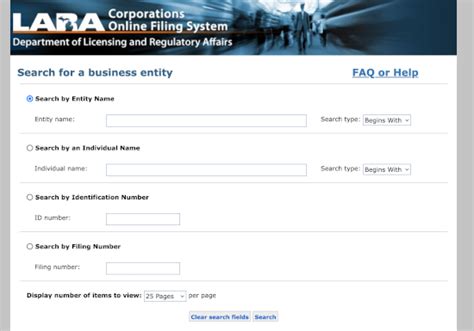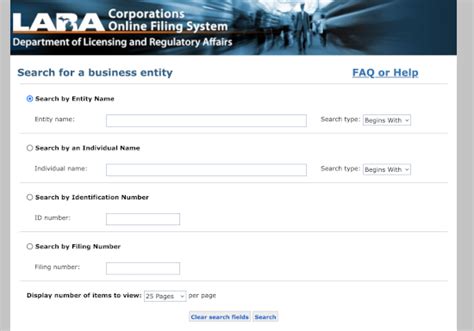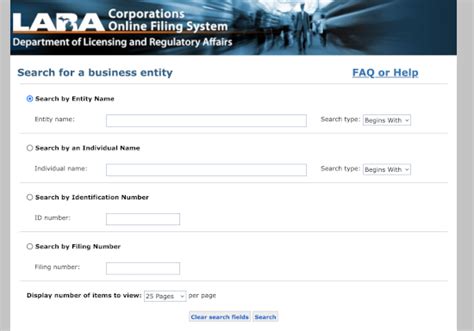Michigan Entity Business Search

Conducting a Michigan entity business search is a crucial step for individuals and organizations looking to establish or expand their business operations within the state. The Michigan Department of Licensing and Regulatory Affairs (LARA) provides a comprehensive database that allows users to search for business entities, including corporations, limited liability companies (LLCs), and limited partnerships. This database is essential for verifying the existence of a business, checking the availability of a business name, and obtaining information about a company's status, formation date, and registered agent.
The Michigan entity business search platform is designed to be user-friendly, allowing users to search by business name, entity ID, or filing number. The search results provide detailed information about the entity, including its status (active, inactive, or dissolved), formation date, registered office address, and the name and address of the registered agent. Additionally, users can access filings and documents related to the entity, such as articles of incorporation, annual reports, and statements of change.
Key Points
- The Michigan Department of Licensing and Regulatory Affairs (LARA) maintains a database for searching business entities.
- The database allows searches by business name, entity ID, or filing number.
- Search results provide detailed information about the entity, including status, formation date, and registered agent details.
- Users can access filings and documents related to the entity through the search platform.
- Conducting a Michigan entity business search is essential for verifying business existence, checking name availability, and obtaining company information.
Why Conduct a Michigan Entity Business Search?

There are several reasons why conducting a Michigan entity business search is important. Firstly, it helps in verifying the existence and legitimacy of a business. This is particularly useful for individuals or companies looking to engage in business transactions or partnerships. By searching the database, one can confirm whether a business is registered and in good standing with the state.
Another critical reason for conducting a search is to check the availability of a proposed business name. Michigan requires that each business entity have a unique name that is distinguishable from other names on file. By searching the database, entrepreneurs can ensure that their proposed business name does not conflict with an existing name, thereby avoiding potential legal issues related to trademark infringement.
How to Conduct a Michigan Entity Business Search
Conducting a Michigan entity business search is a straightforward process. Users start by visiting the LARA website and navigating to the business entity search page. They then have the option to search by business name, entity ID, or filing number. For a name search, users can enter the full or partial name of the business. The database also allows for searches using keywords or phrases within the business name.
Once the search criteria are entered, the user clicks the "search" button, and the database returns a list of matching entities. Each entity listed will have a link to view more details, which includes the entity's status, type, formation date, and other relevant information. Users can also filter search results to narrow down the list based on specific criteria such as entity status or type.
| Search Criteria | Description |
|---|---|
| Business Name | Search for entities by their full or partial name. |
| Entity ID | Search for an entity using its unique identifier assigned by LARA. |
| Filing Number | Search for an entity using the number assigned to its filing documents. |

Understanding Search Results

Interpreting the results of a Michigan entity business search requires understanding the information provided. Each entity’s listing will include its name, entity type (e.g., corporation, LLC, limited partnership), status (e.g., active, inactive, dissolved), and the date of formation. Additionally, the listing will provide the address of the entity’s registered office and the name and address of its registered agent.
For users looking to register a new business, it is essential to review the search results carefully to ensure that the proposed business name does not conflict with an existing name. If a conflict is found, the user must either choose a different name or apply for a name reservation if the desired name is available but not immediately needed.
Entity Status and What It Means
The status of a business entity, as indicated in the search results, provides critical information about its current standing with the state. An “active” status means the entity is in good standing and has fulfilled all necessary filing requirements. An “inactive” status may indicate that the entity has not filed required annual reports or has outstanding issues that need to be addressed. A “dissolved” status means the entity is no longer recognized by the state as a legal business entity, often due to voluntary dissolution by the owners or involuntary dissolution due to failure to comply with state regulations.
What is the purpose of conducting a Michigan entity business search?
+The primary purpose is to verify the existence and legitimacy of a business, check the availability of a proposed business name, and obtain information about a company's status and formation details.
How do I search for a business entity in Michigan?
+You can search by visiting the LARA website and using the business entity search function, which allows searches by business name, entity ID, or filing number.
What information is provided in the search results?
+The search results include the entity's name, type, status, formation date, registered office address, and the name and address of the registered agent, among other details.
In conclusion, conducting a Michigan entity business search is a vital step for anyone looking to establish, expand, or verify the existence of a business in Michigan. By understanding how to use the LARA database and interpret search results, individuals and organizations can ensure compliance with state regulations, avoid potential legal issues, and make informed business decisions.



